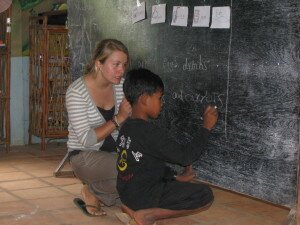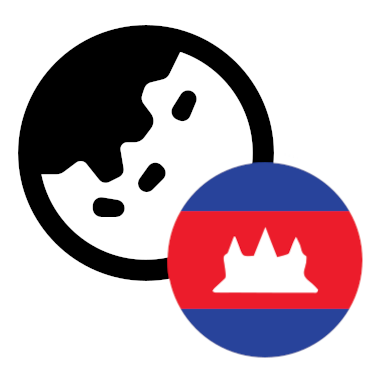
Weltwärts
What is Weltwärts? World-changing.
Before his year volunteering abroad, Julian Fellendorf had no idea that he would learn more from the Cambodian children he taught than they would learn from him. Dorothee Kröger didn’t know that her year of service would influence her path at university or spark a lifelong interest in human rights. Theresia Martin had always loved football but never knew her passion for it could help Cambodian girls achieve their dreams — until she found Weltwärts.
Weltwärts is a programme in which young German nationals between the ages of 18 and 23 perform volunteer service work in developing countries for a period of 12 months. Weltwärts participants partner with organisations all over the globe to aid development work in sustainability, education, and human rights.
Learning through Serving
The programme implements the successful formula of “learning by serving” to achieve two aims: to expand the reach of the partner projects, and to spark interest in development issues in Germany. The volunteer service contributes to “global learning”, enhancing intercultural understanding and helping to increase awareness of how development policy issues impact our future.
In addition to acquiring knowledge of foreign languages and of specialist development topics, the volunteers learn about intercultural communication, cooperation and social responsibility – valuable skills in an increasingly globalised learning and working environment. A generation of civic-minded young women and men gaining experience in the developing world helps to reinforce civil society structures in the developing countries and in Germany.
Service-learning strengthens local communities by fostering collaboration between educational institutions and other organisations in order to meet community needs. Weltwärts offers young people with the drive to make a difference a structured programme to work with projects in developing countries. As the world’s leading provider of international cooperation services for sustainable development, GIZ’s vision is particularly well aligned with that of the Weltwärts programme.
Preparation for a Global Experience
The volunteers receive two weeks of preparation in Germany, and additional training upon arrival in Cambodia. They are placed with partner organisations according to personal interests and talents. During their one-year stay, there are regular review workshops for participants and partner organisations to ensure that the programme is fulfilling its objectives and the volunteers are achieving their goals.
The volunteers fulfil a wide range of tasks, according to their skills and the partner organisations’ needs. These may include organizing art, music or sports activities with girls and boys; IT related assignments, teaching English, administrative support, environmental sustainability initiatives, and more.
Volunteers like Fellendorf learn quickly that “communication is key.” Learning to communicate within the work and residential environments they face during their service year is essential for a successful experience. Kröger credits her ability to overcome “known and also unexpected challenges” to the conversations she had with her project managers. She also found satisfaction in the relationships with the children she met at Chibodia Children’s Home. Hearing the students’ personal stories, she says, “it showed me another perspective on the world, and helped me to gain more patience and empathy. I know these skills will help me throughout my life in future work, study, and personal experiences.”
Portraits of Development and Change
Kröger notes that she and the children at Chibodia Children’s Home “have changed together over the course of the year. They’ve taught me language and cultural skills, and I’ve shared my English and swimming knowledge. The long talks, jokes, and cooking together were things I came to value very much. I hope I’ve influenced their approach towards new ideas – that there is not only one way to answer a question and it’s important to develop critical thinking.”
Fellendorf recalls the profound change he saw in his students during the dance classes he led at Sorya, an NGO providing free education in Takeo province: “From faces directed to the floor or the ceiling after asking them for their opinion, my male and female students started dancing confidently in front of other people. Self-confidence and self-esteem through education: you couldn’t ask for a better outcome.”
Martin coached football and taught English to girls in the Mighty Girls programme at SALT (Sport and Leadership Training) Academy, where the students are members of the national women’s football team. Martin decided to move into the dormitory with her students in order to maximise her impact. She observes, “The girls gained empowerment and a lot of self-confidence. They’re now aware of their ability to become leaders in society and positive role-models to other Cambodian girls. The Mighty Girls programme has given many of them the chance to travel abroad to places like Scotland or Germany. Working hard at sport and school has made them incredibly brave and confident.”
